一般将来时用法-句型和几种语法形式
概述一般将来时的用法

由“ 动 词 w l / h l + 词 原 形 ” 成 ,h l 于 第 一 助 il sa l 动 构 s a l用 不 论干 么人称 一 律 用 w 儿 。 1 1 i
( 否 定形 式 和 疑 问 形式 二) 否定形式是 在 w l i 1和 s a l 加 上 n t缩 写 为 w nt hl 后 o o ’: s a ln t 写 为 sa ’ 。疑 问形式 是 把 w l sa l 到 h l o 缩 hh t n 或 hl 提 主 语 前 。例 如 :
It ik i ’ lr i oo rw hn l a n tm ro 。我想明天会 下雨。 0
() 示将 来 经 常 或 反 复 发生的动 作 。 例 如 : 3表
1w l o e o s e y ue ey w e e d 我 会 每 个 周 iI c m t e o vr e k n .
观看这场 足球比赛。 () b o n o 十动 词 原 形 ” 示 主 观 上 打 算在 将 来 某 1 “ e g ig t 表
H r m t e g ig t u e e e . 她 妈 妈 e o h r i o n o b y h r a nw pn s 要给她 买支新钢笔。 () b on o + 训 原 形 ” 可 以 表示 由于 客 观 因 素 2 “ e g ig t 动 还
“一般将来时”的几种语法形式
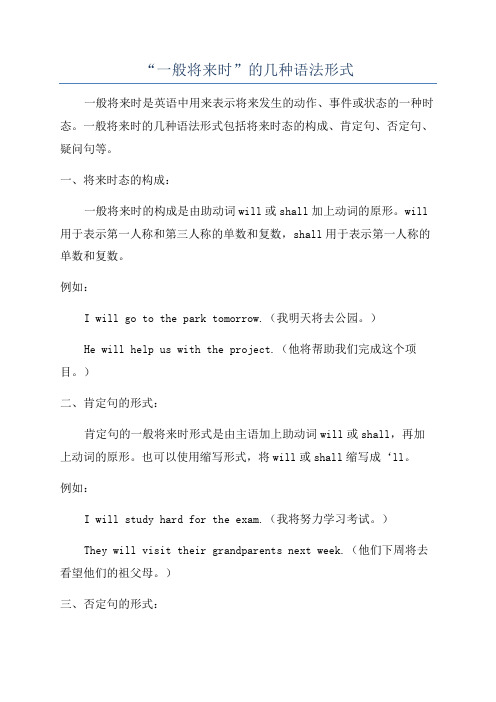
“一般将来时”的几种语法形式一般将来时是英语中用来表示将来发生的动作、事件或状态的一种时态。
一般将来时的几种语法形式包括将来时态的构成、肯定句、否定句、疑问句等。
一、将来时态的构成:一般将来时的构成是由助动词will或shall加上动词的原形。
will 用于表示第一人称和第三人称的单数和复数,shall用于表示第一人称的单数和复数。
例如:I will go to the park tomorrow.(我明天将去公园。
)He will help us with the project.(他将帮助我们完成这个项目。
)二、肯定句的形式:肯定句的一般将来时形式是由主语加上助动词will或shall,再加上动词的原形。
也可以使用缩写形式,将will或shall缩写成‘ll。
例如:I will study hard for the exam.(我将努力学习考试。
)They will visit their grandparents next week.(他们下周将去看望他们的祖父母。
)三、否定句的形式:否定句的一般将来时形式是由主语加上助动词will not或won’t,再加上动词的原形。
例如:I will not go to the party tonight.(我今晚不去参加派对。
)四、疑问句的形式:疑问句的一般将来时形式是将助动词will或shall置于主语之前。
例如:Will you join us for dinner?(你会和我们一起吃晚餐吗?)Shall we go to the movies?(我们去看电影好吗?)五、其他形式:除了will和shall之外,一般将来时还可以使用一些其他词组来表示将来的动作、事件或状态。
例如be going to,be about to等。
1. be going to+动词原形be going to+动词原形表示计划、打算、意图或预测将要发生的事情。
例如:She is going to travel around the world next year.(明年她将要周游世界。
初二英语语法分析--一般将来时用法讲解
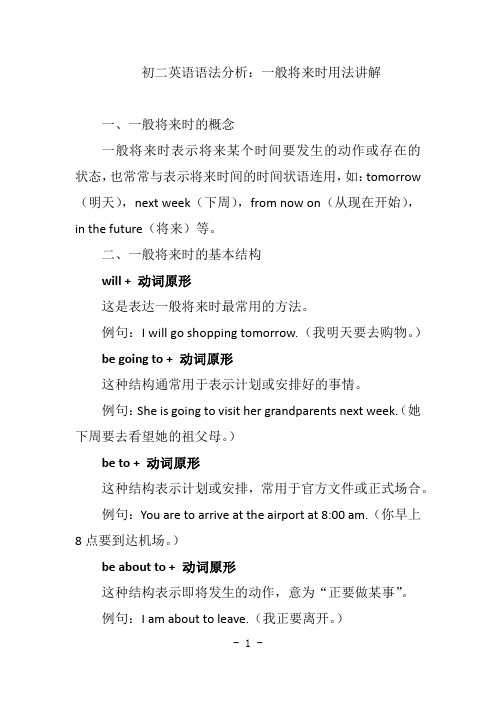
初二英语语法分析:一般将来时用法讲解一、一般将来时的概念一般将来时表示将来某个时间要发生的动作或存在的状态,也常常与表示将来时间的时间状语连用,如:tomorrow (明天),next week(下周),from now on(从现在开始),in the future(将来)等。
二、一般将来时的基本结构will + 动词原形这是表达一般将来时最常用的方法。
例句:I will go shopping tomorrow.(我明天要去购物。
)be going to + 动词原形这种结构通常用于表示计划或安排好的事情。
例句:She is going to visit her grandparents next week.(她下周要去看望她的祖父母。
)be to + 动词原形这种结构表示计划或安排,常用于官方文件或正式场合。
例句:You are to arrive at the airport at 8:00 am.(你早上8点要到达机场。
)be about to + 动词原形这种结构表示即将发生的动作,意为“正要做某事”。
例句:I am about to leave.(我正要离开。
)be due to + 动词原形这种结构表示某事预定或预期将要发生。
例句:The train is due to arrive at 5:00 pm.(火车预定下午5点到达。
)三、一般将来时的用法1表示将来的动作或状态例句:I will buy a new car next year.(明年我要买一辆新车。
)2表示将来的计划或安排例句:We are going to have a picnic this weekend.(我们这个周末要去野餐。
)3表示根据现有情况推测未来的可能性例句:It's going to rain soon.(很快就要下雨了。
)4表示命令、请求、建议等例句:You are to finish your homework before you go out.(你出去之前要把作业做完。
英语语法:一般将来时解释集

英语语法:一般将来时解释大全一、基本定义一般将来时是英语时态的一种,表示将来的动作或状态。
它主要用于描述未来的计划、预测或期望发生的事情。
二、形式构成一般将来时的构成主要有以下几种形式:1. 基本结构:主语+ will /shall + 动词原形+ 其他成分。
这是最基本的一般将来时形式,表示将来的动作或状态。
2. be going to 结构:主语+ be(am, is, are)going to + 动词原形+ 其他成分。
这种结构表示计划或安排将要发生的事情,也可以表示根据目前的迹象或情况预测将会发生的事情。
3. be+动词不定式:主语+ be(am, is, are)to + 动词原形+ 其他成分。
这种结构表示计划或安排将来要做的事情。
4. be+动词ing:主语+ be(am, is, are)+ 动词ing形式+ 其他成分。
这种结构表示即将发生的动作,通常与“when”连用。
5. be+表示时间的介词短语:主语+ be(am, is, are)+ 表示时间的介词短语。
这种结构用于表示将来某个时间点的情况。
6. 将来时间状语:tomorrow, next week, in the future等以上就是一般将来时的主要构成形式。
需要注意的是,在具体使用时,应根据语境和上下文选择合适的构成方式。
三、用法场景1. 表达未来的计划或意图,例如:I will go to the beach next summer.2. 描述未来的预测或期望,例如:It will rain this afternoon.3. 在条件句中表示将来的结果,例如:If you study hard, you will pass the exam.四、与其他时态的区别1. 与现在进行时态的区别:现在进行时态强调正在进行的动作,而一般将来时态强调将来的动作或状态。
2. 与过去时态的区别:过去时态表示过去的动作或状态,与将来时间无关。
一般将来时态知识点详解(初中英语专项复习) (4)
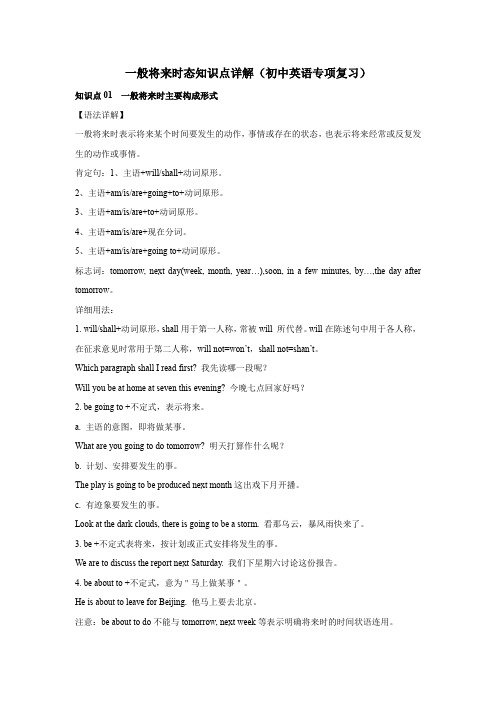
一般将来时态知识点详解(初中英语专项复习)知识点01 一般将来时主要构成形式【语法详解】一般将来时表示将来某个时间要发生的动作,事情或存在的状态,也表示将来经常或反复发生的动作或事情。
肯定句:1、主语+will/shall+动词原形。
2、主语+am/is/are+going+to+动词原形。
3、主语+am/is/are+to+动词原形。
4、主语+am/is/are+现在分词。
5、主语+am/is/are+going to+动词原形。
标志词:tomorrow, next day(week, month, year…),soon, in a few minutes, by…,the day after tomorrow。
详细用法:1. will/shall+动词原形,shall用于第一人称,常被will 所代替。
will在陈述句中用于各人称,在征求意见时常用于第二人称,will not=won’t,shall not=shan’t。
Which paragraph shall I read first? 我先读哪一段呢?Will you be at home at seven this evening? 今晚七点回家好吗?2. be going to +不定式,表示将来。
a. 主语的意图,即将做某事。
What are you going to do tomorrow? 明天打算作什么呢?b. 计划、安排要发生的事。
The play is going to be produced next month这出戏下月开播。
c. 有迹象要发生的事。
Look at the dark clouds, there is going to be a storm. 看那乌云,暴风雨快来了。
3. be +不定式表将来,按计划或正式安排将发生的事。
We are to discuss the report next Saturday. 我们下星期六讨论这份报告。
小升初英语语法句型转换-一般将来时(全国通用版)

am going to go
will go
1.I am tired. I __________
(go) to bed early
tonight.
2.Mary’s birthday is next Monday. Her brother
_____________(give)
her a present.
(2)否定句:
主语+ be + not going to +动词原形+其他.
如:
I am not going to plant trees this weekend. 这个周
末我不打算去种树。
They aren’t going to climb mountains this week.
这周他们不打算去爬山。
下周你们要去做什么?
—We will have a picnic in the park.
我们将去公园野餐。
一般将来时的用法
1. 时间标志词:
1⃣️tomorrow系列
2⃣️next系列
3⃣️in the future
4⃣️in+一段时间 等表示将来的时间状语。
如:
We will go to Shanghai next week.
week.(改否定)
won’t
go
Shirley ____ ____ to visit her grandma next
week.(改否定)
练习
We will hold a meeting this evening.(改一般疑
问句)
you
Will
____ ____ hold a meeting this evening?
(完整)一般将来时的被动语态

I语法:一般将来时的被动语态一般将来时的被动语态“……将要被……”,其常用的表达形式有“will/shall+be+及物动词的过去分词”,“be going to+be+及物动词的过去分词”,“be to+be+及物动词的过去分词”三种。
一、一般将来时的被动语态的几种句式:1、肯定式:主语+shall/will+be+及物动词的过去分词+其他2、否定式:主语+shall/will+ not+be+及物动词的过去分词+其他3、一般疑问式:Shall/Will+主语+be+及物动词的过去分词+其他4、特殊疑问式:特殊疑问词+shall/will+主语+be+及物动词的过去分词+其他二、一般将来时的被动语态的用法:1、表示根据计划或者安排将要发生的被动动作。
2、表示有固定性条件就有规律性的被动结果。
Heated to 100 0C, water will be turned into steam。
加热到100摄氏度,水将会变成水蒸汽。
If you speak in class, you will be punished.三、一般将来时被动语态的注意事项:1、在时间、条件状语从句中,应使用现在时表示将来时。
同样,应使用现在时的被动语态表示将来时的被动语态。
He says he will leave the company if he is punished for this。
When the dam is completed, the Changjiang River will be controlled。
2、使用一般将来时的被动语态时,不要遗漏被动式中的be.现在完成时的被动语态现在完成时的被动语态强调一个发生在过去的被动性动作持续到现在或对现在造成的影响或结果。
一、现在完成时的被动语态的构成:Have/has+been+及物动词的过去分词二、现在完成时的被动语态的形式:1、肯定式:主语+have/has+be+及物动词的过去分词+其他The car has been repaired.2、否定式:主语+have/has+ not+be+及物动词的过去分词+其他The house has not been cleaned for a long time。
一般将来时的语法规则
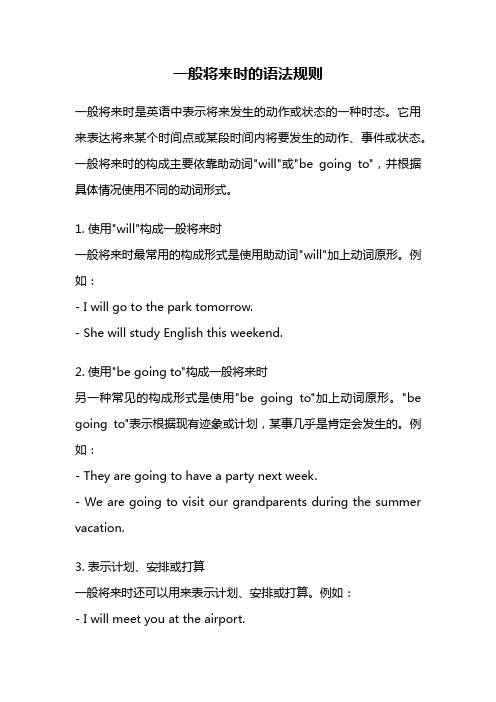
一般将来时的语法规则一般将来时是英语中表示将来发生的动作或状态的一种时态。
它用来表达将来某个时间点或某段时间内将要发生的动作、事件或状态。
一般将来时的构成主要依靠助动词"will"或"be going to",并根据具体情况使用不同的动词形式。
1. 使用"will"构成一般将来时一般将来时最常用的构成形式是使用助动词"will"加上动词原形。
例如:- I will go to the park tomorrow.- She will study English this weekend.2. 使用"be going to"构成一般将来时另一种常见的构成形式是使用"be going to"加上动词原形。
"be going to"表示根据现有迹象或计划,某事几乎是肯定会发生的。
例如:- They are going to have a party next week.- We are going to visit our grandparents during the summer vacation.3. 表示计划、安排或打算一般将来时还可以用来表示计划、安排或打算。
例如:- I will meet you at the airport.- She is going to take a vacation next month.4. 表示预测、推测或判断一般将来时还可用来表示预测、推测或判断。
例如:- It will rain tomorrow.- The price of oil is going to increase.5. 使用时间状语和频率副词在一般将来时的句子中,可以使用时间状语词或频率副词来指明动作发生的时间或频率。
例如:- He will come to the party tonight.- They are going to travel to Europe next year.6. 否定形式和疑问形式在一般将来时的句子中,要表示否定形式,只需在助动词"will"前加上"not"。
专题五、一般将来时、be-going-to用法

初中基础语法--专题五、一般将来时、be going to用法一、一般将来时的动词形式一般将来时表示将要发生的动作或存在的状态;或是打算计划以及决定要做某件事情等。
常与tomorrow, next… , in (the)future,soon, in five days,i n two weeks等连用。
“I’ll, You’ll, He’ll , She’ll , It’ll, We’ll , They’ll …”是简缩形式。
其结构有如下几种:1.will + 动词原形(will可以用于任何人称)注意:当主语是第一人称时will可以换成shall,特别是在以I或we作主语的问句中,一般用shall.She will come back in three days.Shall we go to the zoo?I will be at home tomorrow.2.be going to +动词原形They are going to clean their classroom this afternoon.二.一般将来时的各种句型1.肯定句:主语+shall /will+动词+其他.They will go shopping this afternoon.We shall be there before dark.2.否定句:主语+shall /will+not+动词+其他.They will go shopping this afternoon.We shall not be there before dark.3.一般疑问句:shall /will+主语+动词+其他?Will they go shopping this afternoon?Shall we be there before dark?4.特殊疑问句:特殊疑问词+shall /will+主语+动词+其他?When will they go shopping?What sall I do?5.there be的将来时:there will beThere will be a show in the park tonight.一、选择1. _____you ____a doctor when you grow up?A Will; going to beB Are; going to beC Are; /D Will; be2. He will be back _____a few minutes.A withB forC onD in3. What time _____we meet at the gate tomorrow?A willB shallC doD are4. It ____my brother’s birthday tomorrow. She is going to have a party.A is going to beB will beC will isD will have5. Li Ming is 10 years old now, next year he _____11.A isB is going to beC will beD will to be二、用所给词适当形式填空1. -“I need some paper.”- “I ____(bring)some for you.”2.____ (be)you free tomorrow?3. They _________(not leave) until you come back.4. _____we_____(go) to the party together this afternoon?5. There (be) a sports meeting in our school tomorrow.6. I _____(go) with you if I have time.7.Hurry up! Or we ______(be) late.8.What ____you _______(do) tomorrow afternoon?9. Jenny ____ _____ (do) an experiment the day after tomorrow.10. If she isn’t free tomorrow, she _______(not take) part in the party.be going to用法be going to 是一种固定结构,其中"be"会根据主语的人称变化用"is, am ,are",它后面要接动词原形。
一般将来时态的用法和答题技巧
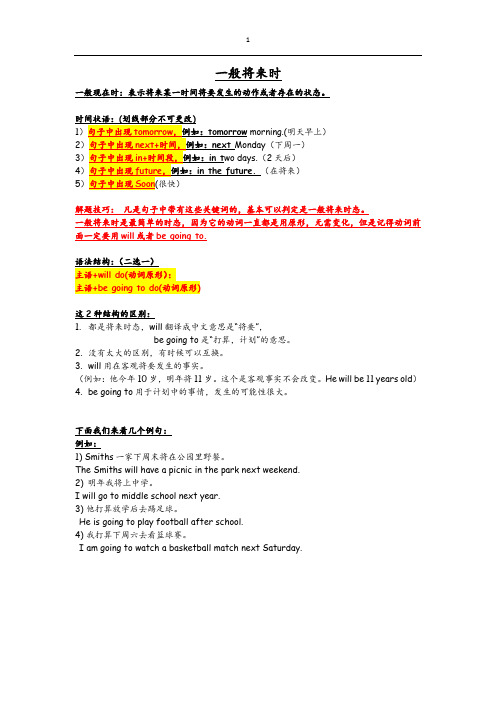
一般将来时一般现在时:表示将来某一时间将要发生的动作或者存在的状态。
明天早上)(下周一)2天后)解题技巧:凡是句子中带有这些关键词的,基本可以判定是一般将来时态。
一般将来时是最简单的时态,因为它的动词一直都是用原形,无需变化,但是记得动词前面一定要用will或者be going to.语法结构:(二选一)主语+will do(动词原形):主语+be going to do(动词原形)这2种结构的区别:1.都是将来时态,will翻译成中文意思是“将要”,be going to是“打算,计划”的意思。
2.没有太大的区别,有时候可以互换。
3.will用在客观将要发生的事实。
(例如:他今年10岁,明年将11岁。
这个是客观事实不会改变。
He will be 11 years old)4.be going to用于计划中的事情,发生的可能性很大。
下面我们来看几个例句:例如:1) Smiths一家下周末将在公园里野餐。
The Smiths will have a picnic in the park next weekend.2) 明年我将上中学。
I will go to middle school next year.3)他打算放学后去踢足球。
He is going to play football after school.4)我打算下周六去看篮球赛。
I am going to watch a basketball match next Saturday.练习题:一、请翻译下列句子:1)Helen打算放学后走路回家。
2)Ben打算下周日去图书馆看书。
3)Mike明天晚上将要参加Kim的生日派对。
4)他打算下周六打扫房子。
5)你明年打算做什么?6)Tom下个月将不在这里工作。
7)下个月将是植树节,李明打算和父母亲一起去植树。
8)妈妈打算端午节的时候做一些粽子,我希望你能来和我们分享一些。
9)我们十月份将去参观长城。
专题五、一般将来时、be-going-to用法

专题五、一般将来时、be-going-to用法初中基础语法--专题五、一般将来时、be going to用法一、一般将来时的动词形式一般将来时表示将要发生的动作或存在的状态;或是打算计划以及决定要做某件事情等。
常与tomorrow, next… , in (the)future,soon, in five days,in two week s等连用。
“I’ll, You’ll, He’ll , She’ll , It’ll, We’ll , They’ll …”是简缩形式。
其结构有如下几种:1.will + 动词原形(will可以用于任何人称)注意:当主语是第一人称时will可以换成shall,特别是在以I或we作主语的问句中,一般用shall.She will come back in three days.Shall we go to the zoo?I will be at home tomorrow.2.be going to +动词原形They are going to clean their classroom this afternoon.二.一般将来时的各种句型1.肯定句:主语+shall /will+动词+其他.They will go shopping this afternoon.We shall be there before dark.2.否定句:主语+shall /will+not+动词+其他.They will go shopping this afternoon.We shall not be there before dark.3.一般疑问句:shall /will+主语+动词+其他?Will they go shopping this afternoon?Shall we be there before dark?4.特殊疑问句:特殊疑问词+shall /will+主语+动词+其他?When will they go shopping?What sall I do?5.there be的将来时:there will beThere will be a show in the park tonight.一、选择1. _____you ____a doctor when you grow up?A Will; going to beB Are; going to beC Are; /D Will; be2. He will be back _____a few minutes.A withB forC onD in3. What time _____we meet at the gate tomorrow?A willB shallC doD are4. It ____my brother’s birthday tomorrow. She is going to have a party.A is going to beB will beC will isD will have5. Li Ming is 10 years old now, next year he _____11.A isB is going to beC will beD will to be二、用所给词适当形式填空1. -“I need some paper.”- “I ____(bring)some for you.”2.____ (be)you free tomorrow?3. They _________(not leave) until you come back.4. _____we_____(go) to the party together this afternoon?5. There (be) a sports meeting in our school tomorrow.6. I _____(go) with you if I have time.7.Hurry up! Or we ______(be) late.8.What ____you _______(do) tomorrow afternoon?9. Jenny ____ _____ (do) an experiment the day after tomorrow.10. If she isn’t free tomorrow, she _______(not take) part in the party.be going to用法be going to 是一种固定结构,其中"be"会根据主语的人称变化用"is, am ,are",它后面要接动词原形。
一般将来时的表达形式
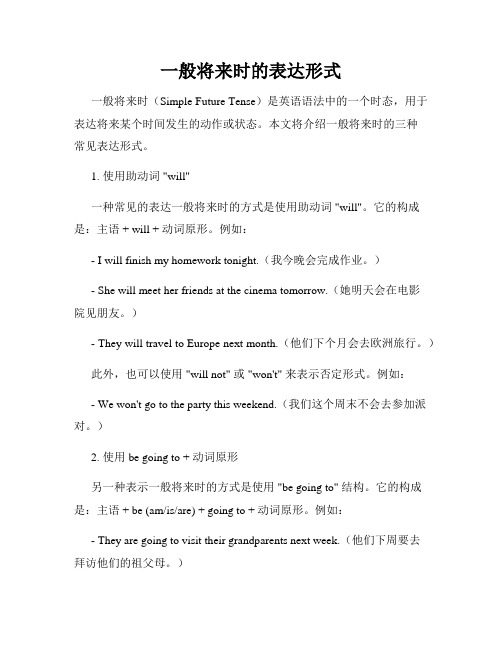
一般将来时的表达形式一般将来时(Simple Future Tense)是英语语法中的一个时态,用于表达将来某个时间发生的动作或状态。
本文将介绍一般将来时的三种常见表达形式。
1. 使用助动词 "will"一种常见的表达一般将来时的方式是使用助动词 "will"。
它的构成是:主语 + will + 动词原形。
例如:- I will finish my homework tonight.(我今晚会完成作业。
)- She will meet her friends at the cinema tomorrow.(她明天会在电影院见朋友。
)- They will travel to Europe next month.(他们下个月会去欧洲旅行。
)此外,也可以使用 "will not" 或 "won't" 来表示否定形式。
例如:- We won't go to the party this weekend.(我们这个周末不会去参加派对。
)2. 使用 be going to + 动词原形另一种表示一般将来时的方式是使用 "be going to" 结构。
它的构成是:主语 + be (am/is/are) + going to + 动词原形。
例如:- They are going to visit their grandparents next week.(他们下周要去拜访他们的祖父母。
)- I am going to learn how to play the piano.(我打算学习弹钢琴。
)- She isn't going to eat fast food anymore.(她不再打算吃快餐了。
)该结构也可以用于否定形式,只需在 "be" 后加 "not"。
小学英语“一般将来时”语法知识
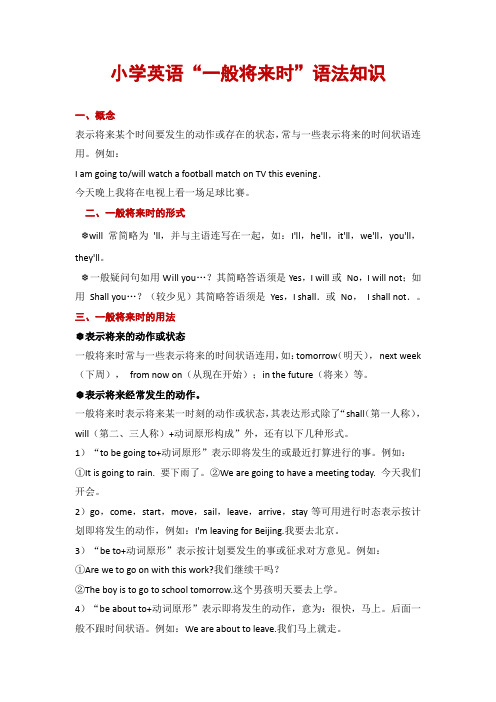
小学英语“一般将来时”语法知识一、概念表示将来某个时间要发生的动作或存在的状态,常与一些表示将来的时间状语连用。
例如:I am going to/will watch a football match on TV this evening.今天晚上我将在电视上看一场足球比赛。
二、一般将来时的形式❆will 常简略为'll,并与主语连写在一起,如:I'll,he'll,it'll,we'll,you'll,they'll。
❆一般疑问句如用Will you…?其简略答语须是Yes,I will或No,I will not;如用Shall you…?(较少见)其简略答语须是Yes,I shall.或No,I shall not.。
三、一般将来时的用法❆表示将来的动作或状态一般将来时常与一些表示将来的时间状语连用,如:tomorrow(明天),next week (下周),from now on(从现在开始);in the future(将来)等。
❆表示将来经常发生的动作。
一般将来时表示将来某一时刻的动作或状态,其表达形式除了“shall(第一人称),will(第二、三人称)+动词原形构成”外,还有以下几种形式。
1)“to be going to+动词原形”表示即将发生的或最近打算进行的事。
例如:①It is going to rain. 要下雨了。
②We are going to have a meeting today. 今天我们开会。
2)go,come,start,move,sail,leave,arrive,stay等可用进行时态表示按计划即将发生的动作,例如:I'm leaving for Beijing.我要去北京。
3)“be to+动词原形”表示按计划要发生的事或征求对方意见。
例如:①Are we to go on with this work?我们继续干吗?②The boy is to go to school tomorrow.这个男孩明天要去上学。
英语一般将来时态基本结构及用法
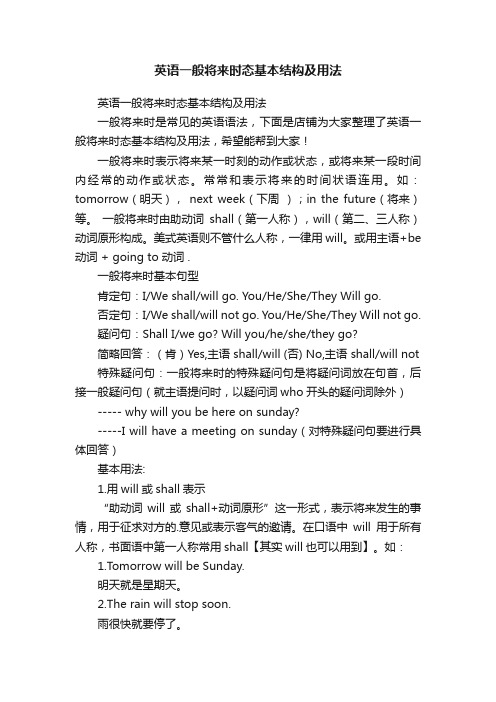
英语一般将来时态基本结构及用法英语一般将来时态基本结构及用法一般将来时是常见的英语语法,下面是店铺为大家整理了英语一般将来时态基本结构及用法,希望能帮到大家!一般将来时表示将来某一时刻的动作或状态,或将来某一段时间内经常的动作或状态。
常常和表示将来的时间状语连用。
如:tomorrow(明天),next week(下周);in the future(将来)等。
一般将来时由助动词shall(第一人称),will(第二、三人称)动词原形构成。
美式英语则不管什么人称,一律用will。
或用主语+be 动词 + going to 动词 .一般将来时基本句型肯定句:I/We shall/will go. You/He/She/They Will go.否定句:I/We shall/will not go. You/He/She/They Will not go.疑问句:Shall I/we go? Will you/he/she/they go?简略回答:(肯)Yes,主语 shall/will (否) No,主语 shall/will not 特殊疑问句:一般将来时的特殊疑问句是将疑问词放在句首,后接一般疑问句(就主语提问时,以疑问词who开头的疑问词除外)----- why will you be here on sunday?-----I will have a meeting on sunday(对特殊疑问句要进行具体回答)基本用法:1.用will或shall表示“助动词will或shall+动词原形”这一形式,表示将来发生的事情,用于征求对方的.意见或表示客气的邀请。
在口语中will用于所有人称,书面语中第一人称常用shall【其实will也可以用到】。
如:1.Tomorrow will be Sunday.明天就是星期天。
2.The rain will stop soon.雨很快就要停了。
3.Shall we go there at five?我们五点钟去那儿?4.Will you please open the door?请你把门打开?2.用be going to结构表示"be going to+动词原形”用来表示事先考虑过的将要发生的动作以及已有迹象表明必将要发生的某事,意为“打算;就要”。
小学英语语法之一般将来时

小学英语语法之一般将来时小学英语语法之一般将来时在英语语法中,一般将来时是一种常用的时态,它表示将来要发生的事情。
对于小学生来说,理解并掌握一般将来时的规则和用法是非常重要的。
本文将通过定义、基本语法、句型变化、实例分析和注意事项五个方面,详细介绍小学英语语法之一般将来时。
一、定义一般将来时表示将来要发生的事情,通常与时间状语“will”和“shall”相关联。
例如:1、I will go to the park tomorrow.2、Shall we have a party next weekend?二、基本语法一般将来时的基本语法结构包括否定词、肯定词和连接词。
1、否定词:在一般将来时中,否定词通常使用“not”,例如“I will not go to the party.”表示“我不会去参加聚会”。
2、肯定词:肯定词使用频率最高的就是“will”,表示未来的意愿。
例如“She will bring her book tomorrow.”表示“她明天会带她的书”。
3、连接词:连接词在一般将来时中通常是“and”或“or”,例如“Hewill play football and I will watch TV.”表示“他将踢足球,我将会看电视”。
三、句型变化一般将来时有多种句型变化,以下是常见的几种:1、将来式:主语 + will + 动词原形例如:You will have a new friend next week.2、过去式:主语 + would + 动词原形例如:Last week, he would not eat vegetables.3、现在式:主语 + be going to + 动词原形例如:We are going to watch a movie tonight.四、实例分析让我们通过一些具体的例子来分析一般将来时的用法:例1:My parents will visit us next month. 下个月,我的父母将会来看我们。
初中英语语法:一般现在时、一般过去时和一般将来时
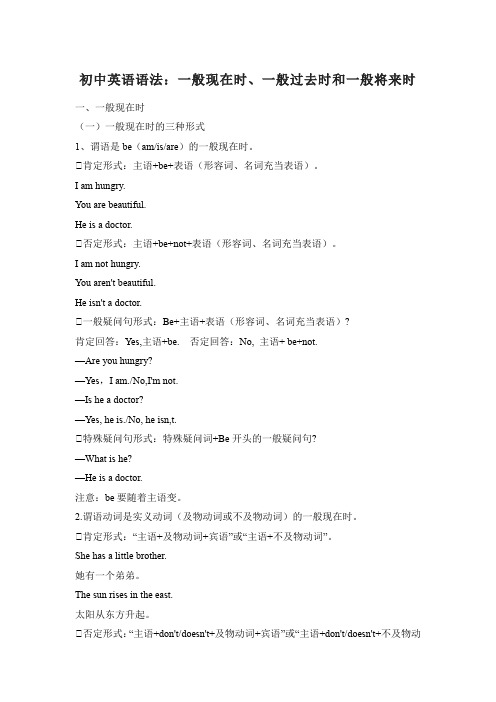
初中英语语法:一般现在时、一般过去时和一般将来时一、一般现在时(一)一般现在时的三种形式1、谓语是be(am/is/are)的一般现在时。
①肯定形式:主语+be+表语(形容词、名词充当表语)。
I am hungry.You are beautiful.He is a doctor.①否定形式:主语+be+not+表语(形容词、名词充当表语)。
I am not hungry.You aren't beautiful.He isn't a doctor.①一般疑问句形式:Be+主语+表语(形容词、名词充当表语)?肯定回答:Yes,主语+be. 否定回答:No, 主语+ be+not.—Are you hungry?—Yes,I am./No,I'm not.—Is he a doctor?—Yes, he is./No, he isn,t.①特殊疑问句形式:特殊疑问词+Be开头的一般疑问句?—What is he?—He is a doctor.注意:be要随着主语变。
2.谓语动词是实义动词(及物动词或不及物动词)的一般现在时。
①肯定形式:“主语+及物动词+宾语”或“主语+不及物动词”。
She has a little brother.她有一个弟弟。
The sun rises in the east.太阳从东方升起。
①否定形式:“主语+don't/doesn't+及物动词+宾语”或“主语+don't/doesn't+不及物动词”。
She doesn't have a little brother.她没有弟弟。
I don't eat every morning.我每天早晨都不吃饭。
①一般疑问句形式:“Do/Does+主语+及物动词原形+宾语”或“Do/Does+主语+不及物动词原形”。
肯定回答:Yes,主语+do/does. 否定回答是:No, 主语+ don't/doesn't.—Do you eat every morning?—Yes, I do./No, I don't.—Does she have a little brother?—Yes, she does./No, she doesn't.①特殊疑问句:特殊疑问词+do/does开头的一般疑问句?What do you like?When do you go to school?注意:根据主语确定用do还是does。
一般将来时用法-句型和几种语法形式
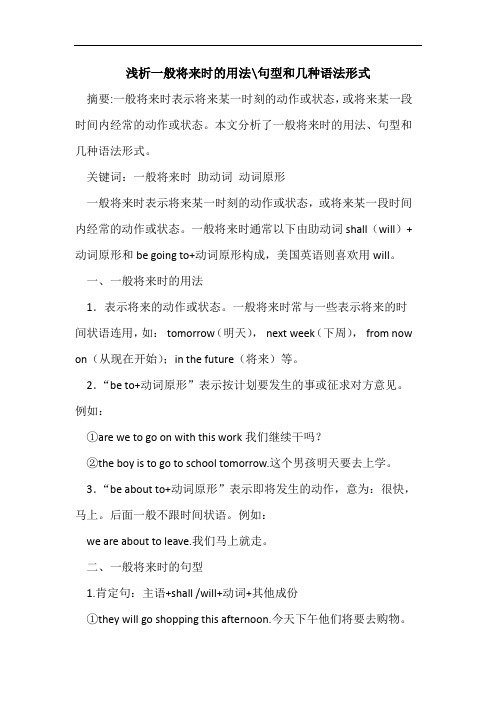
浅析一般将来时的用法\句型和几种语法形式摘要:一般将来时表示将来某一时刻的动作或状态,或将来某一段时间内经常的动作或状态。
本文分析了一般将来时的用法、句型和几种语法形式。
关键词:一般将来时助动词动词原形一般将来时表示将来某一时刻的动作或状态,或将来某一段时间内经常的动作或状态。
一般将来时通常以下由助动词shall(will)+动词原形和be going to+动词原形构成,美国英语则喜欢用will。
一、一般将来时的用法1.表示将来的动作或状态。
一般将来时常与一些表示将来的时间状语连用,如:tomorrow(明天),next week(下周),from now on(从现在开始);in the future(将来)等。
2.“be to+动词原形”表示按计划要发生的事或征求对方意见。
例如:①are we to go on with this work我们继续干吗?②the boy is to go to school tomorrow.这个男孩明天要去上学。
3.“be about to+动词原形”表示即将发生的动作,意为:很快,马上。
后面一般不跟时间状语。
例如:we are about to leave.我们马上就走。
二、一般将来时的句型1.肯定句:主语+shall /will+动词+其他成份①they will go shopping this afternoon.今天下午他们将要去购物。
②we shall be there before dark.我们天黑前会到达那里。
2.否定句:主语+shall /will+not+动词+其他成份①i will not go shopping one hour later.一小时之后我不会去购物。
②he won’t play football with you before he finishes his work.他干完活后才能跟你踢足球。
3.一般疑问句:shall /will+主语+动词+其他成份。
“一般将来时”的几种语法形式

“一般将来时”的几种语法形式一般将来时是描述将来发生的动作、事件或状态的一种时态,表示将来一些时间或一些时刻发生的动作或状态。
在英语中,一般将来时有几种语法形式。
下面将详细介绍这几种形式。
1. will + 动词原形:这是一般将来时最基本、最常见的表达方式。
它主要用于表示意图、决定、预测、承诺等。
例如:- I will go to the supermarket tomorrow.(明天我会去超市。
)- She will travel to Paris next month.(下个月她会去巴黎旅行。
)- They will study for the test tonight.(他们会今晚为考试而学习。
)2. be going to + 动词原形:这种形式用于表示目的、计划、预测强烈以及基于现在的迹象或证据得出的行动。
例如:- He is going to visit his grandparents this weekend.(他计划在这个周末去看望他的祖父母。
)- They are going to buy a new car next year.(明年他们打算买一辆新车。
)- It looks like it is going to rain soon.(看起来很快就要下雨了。
)3. 动词原形: 当时间状语已经指明了将来,且主语是第一人称(I 或We)时,可以省略will或be going to,直接使用动词原形表示一般将来时。
例如:- I think I will pass the exam.(我认为我会通过考试。
)- We hope to see you next week.(我们希望下周见到你。
)4. be + going to + 动词原形:这种形式在第一人称(I或We)以外的主语中也可以使用,表示计划、安排、预测等。
例如:- He is going to start his new job next month.(他打算下个月开始新工作。
一般将来时
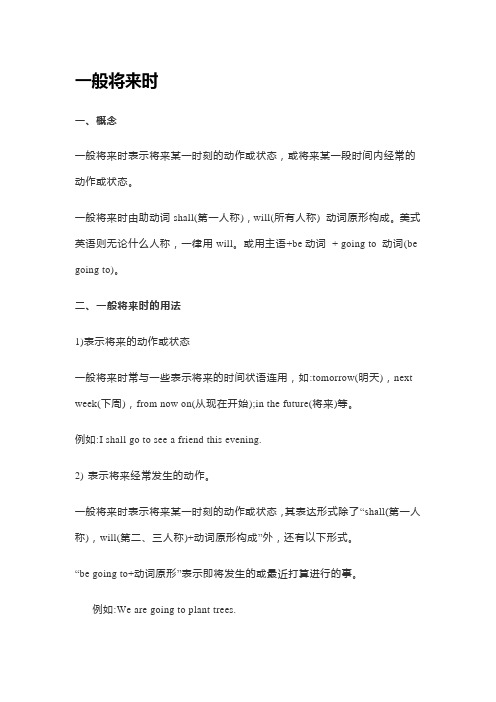
一般将来时一、概念一般将来时表示将来某一时刻的动作或状态,或将来某一段时间内经常的动作或状态。
一般将来时由助动词shall(第一人称),will(所有人称) 动词原形构成。
美式英语则无论什么人称,一律用will。
或用主语+be动词+ going to 动词(be going to)。
二、一般将来时的用法1)表示将来的动作或状态一般将来时常与一些表示将来的时间状语连用,如:tomorrow(明天),next week(下周),from now on(从现在开始);in the future(将来)等。
例如:I shall go to see a friend this evening.2)表示将来经常发生的动作。
一般将来时表示将来某一时刻的动作或状态,其表达形式除了“shall(第一人称),will(第二、三人称)+动词原形构成”外,还有以下形式。
“be going to+动词原形”表示即将发生的或最近打算进行的事。
例如:We are going to plant trees.三、一般将来时的句型①肯定句:主语+ be going to do /will/shall+ 动词原形②否定句:主语+ be not going to do /will not/shall not+ 动词原形③疑问句:Be动词+主语+ going to do /Will/Shall+主语+ 动词原形简略回答:(肯)Yes,主语shall/will (否) No,主语+shan't/won't④特殊疑问句:特殊疑问词+一般疑问句(就主语提问时,以疑问词who开头的疑问词除外)----- Why will you be here on Sunday?(周日你为什么将要在这儿?)-----I will have a meeting on Sunday(我将要在周日举行一个聚会)(对特殊疑问句要进行具体回答)一般疑问句:be或will提到句首,some改any,and改or,第一二人称互换We are going to go on an outing this weekend.-------Are you going to go on an outing this weekend?被动句:will/shall+be+v.ed(及物动词过去分词)The letter will be sent tomorrow.这封信明天将寄出去We shall be punished if we break the rule.如果我们违反规定,我们将受到惩罚。
- 1、下载文档前请自行甄别文档内容的完整性,平台不提供额外的编辑、内容补充、找答案等附加服务。
- 2、"仅部分预览"的文档,不可在线预览部分如存在完整性等问题,可反馈申请退款(可完整预览的文档不适用该条件!)。
- 3、如文档侵犯您的权益,请联系客服反馈,我们会尽快为您处理(人工客服工作时间:9:00-18:30)。
浅析一般将来时的用法\句型和几种语法形式
摘要:一般将来时表示将来某一时刻的动作或状态,或将来某一段时间内经常的动作或状态。
本文分析了一般将来时的用法、句型和几种语法形式。
关键词:一般将来时助动词动词原形
一般将来时表示将来某一时刻的动作或状态,或将来某一段时间内经常的动作或状态。
一般将来时通常以下由助动词shall(will)+动词原形和be going to+动词原形构成,美国英语则喜欢用will。
一、一般将来时的用法
1.表示将来的动作或状态。
一般将来时常与一些表示将来的时间状语连用,如: tomorrow(明天), next week(下周), from now on(从现在开始);in the future(将来)等。
2.“be to+动词原形”表示按计划要发生的事或征求对方意见。
例如:
①are we to go on with this work?我们继续干吗?
②the boy is to go to school tomorrow.这个男孩明天要去上学。
3.“be about to+动词原形”表示即将发生的动作,意为:很快,马上。
后面一般不跟时间状语。
例如:
we are about to leave.我们马上就走。
二、一般将来时的句型
1.肯定句:主语+shall /will+动词+其他成份
①they will go shopping this afternoon.今天下午他们将要去购物。
②we shall be there before dark.我们天黑前会到达那里。
2.否定句:主语+shall /will+not+动词+其他成份
①i will not go shopping one hour later.一小时之后我不会去购物。
②he won’t play football with you before he finishes his work.他干完活后才能跟你踢足球。
3.一般疑问句:shall /will+主语+动词+其他成份。
will you please open the window?请你打开窗户好吗?
4.特殊疑问句:特殊疑问词+shall /will+主语+动词+其他成份where will you go next week?下星期你去哪?
三、一般将来时的几种语法形式
初中英语中表示一般将来时的语法形式有四种:shall/will+动词原形;be going to+动词原形;现在进行时和一般现在时。
现将这四种形式分述如下:
(一)shall/will+动词原形
1. will可用于所有人称,但shall仅表示单纯将来时,用于第一人称i和we,作为will的一种替代形式。
以you and i为主语时通常避免用shall.例如:
①he will be back soon.他很快就会回来。
②i shall/will be free on sunday.星期天我有空
2. will,shall可用来预言将来发生的事。
如说出我们设想会发生的事,或者请对方预言将要发生什么事。
例如:
it will rain tomorrow.明天将要下雨。
3. will,shall除可表示单纯的将来时以外,还可以带有意愿的色彩,仍指的是将来。
例如:
i’ll buy you a bicycle for your birthday.你过生日时,我给你买一辆自行车。
(表示允诺)
(二)be going to+动词原形
1.表示说话人根据现在已有的迹象,判断将要或即将发生某种情况。
这类句子的主语可以是人,也可是物。
例如:
there is going to be a football match in our school tomorrow afternoon.明天下午我们学校将有一场足球赛。
(已有告示)
2.表示主语现在的意图或现已做出的决定,即打算在最近或将来进行某事。
这种意图或决定往往是事先经过考虑的。
例如:
he isn’t going to see his elder brother tomorrow.他明天不准备去看他哥哥。
3.只是单纯地预测未来的事,此时可与will互换。
例如:i think it is going to/will rain this evening.我认为今晚要下雨。
(三)现在进行时表示将来
1.表示位置转移的动词(如go,come,leave,start,arrive,return,send,move,travel,fly等)和其它几个动作动词(如do,begin,work,spend,play,stay,happen,have,finish,
join,eat,die,meet等)常与现在进行时和表示将来的时间状语连用,表示在最近将要发生某事。
这些事是事先安排好的。
例如:the browns are coming to dinner tomorrow.明天布朗夫妇要来吃晚饭。
2.在特定的上下文中,这类动词有时也可不带时间状语。
例如:a:come to school in your old clothes tomorrow .明天穿你的旧衣服来上学
b:why?what’s happening?为什么?有什么事?
(四)一般现在时表示将来
1.动词be;表示位置转移的动词(如go,come,arrive,leave,return等)和表示“开始,结束”的动词(如start,begin,open,finish,end,close等)与一般现在时和表示将来的时间状语连用,表示时间表、节目单或日程表上所安排好的动作或事态将要发生,日程不易改变,口气肯定。
例如:
school finishes on january 18th.学期一月十八日结束。
将来。
例如:
if it doesn’t rain tomorrow,we’ll go to the east lake.如果明天不下雨,我们就去东湖。
3.在hope后接表示将来时间的宾语从句中,也可用一般现在时代替一般将来时,hope的主语往往是第一人称。
例如:
i hope you(will)have a good holiday.我希望你假日愉快。
四、注意事项
1.be about to不能与tomorrow, next week等表示明确将来时的时间状语连用。
2.let’s…的附加疑问通常使用”…, shall we ?”.let’s have
a rest, shall we?
3.问句是“shall…?”,答句就用“shall ~”;问句用“will…?”,答句就用“will ~”。
要前后保持一致。
①shall you go to school next week ?
yes, i shall we’ll have an exam.
②will you have an exam tomorrow?
yes, i will. / no, i won’t.。
